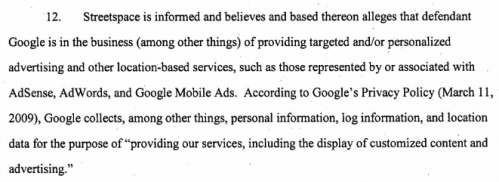StreetSpace Sues Google, Nokia, Apple, Mobile Ad Networks For Infringement Of Location-Based Ads Patent
StreetSpace is a company you probably haven’t heard of, but it’s not a so-called “patent troll” seeking to cash in on unimplemented intellectual property. Rather StreetSpace is a company that has been around since 1999 and installs internet kioks in public spaces, such as airports, retail locations and restaurants. Here’s a description of its main […]
StreetSpace is a company you probably haven’t heard of, but it’s not a so-called “patent troll” seeking to cash in on unimplemented intellectual property. Rather StreetSpace is a company that has been around since 1999 and installs internet kioks in public spaces, such as airports, retail locations and restaurants. Here’s a description of its main product, the “Web Station”:
The Web Station™ was envisioned with the idea that users would be able to simply “Walk up to the Web” in thousands of retail locations, shopping malls, banks, transit hubs, restaurants, café’s and places of interest for quick check-ins for email, information, or online services to users on the go. These sleek terminals give users a different browsing experience to surfing the Web at home as it engages the user at the point they are most likely to conduct a retail transaction, book a ticket, or make a purchase query.
The company has a patent that it claims is being infringed upon by Google, Apple, Nokia and all of the major mobile ad networks. The claimed infringement comes in the form of delivery of location-based and/or personalized advertising. More on the merits of the claim in a moment.
Apparently there were multiple lawsuits that have now been consolidated into a single action before the federal US District Court (Northern District of California). Here’s the claim in a nutshell against Google, repeated and alleged equally against all defendants:
So does this litigation have any merit? Is the patent in fact broad enough to compel all these major tech companies and ad networks to pony up hefty license fees and/or settle for megabucks? Indeed, if the suit had merit it could be worth many millions and even billions of dollars over time.
Again: “Defendant is in the business of providing targeted and/or personalized advertising and other location-based services.”
StreetSpace is arguing that it has patented delivery of location-based and personalized advertising and related services, in essence. I don’t believe that’s what the patent says or protects. (Insert disclaimer about not being a patent attorney here.) Therefore I think that the lawsuit will fail, and go down before any trial on what’s called “summary judgment.” It’s a procedural motion that effectively says: even if all the facts are as the plaintiff says it doesn’t have a valid legal claim.
Here’s the “abstract” from the StreetSpace patent:
A method and system for providing, personalized and integrated online services for communications and commercial transactions both in private and public venues. The invention provides personalized information that is conveniently accessible through a network of public access stations (or terminals) which are enabled by a personal system access card (e.g., smart card). The invention also provides advertisers the opportunity to directly engage action; and potential user-consumers with selected advertising or marketing content based on each user’s profile and usage history.
What StreetSpace appears to have patented is the delivery of location-based ads and personalized content and/or ads “through a network of public access stations.” But none of the defendants delivers any services or advertising through “public access stations” (not to mention the use of “smart cards”).
The company will be forced to argue that the kioks are just one way to deliver the content/ads and the patent doesn’t depend on them. However I’m confident the court will disagree and limit its reading of the scope of the patent accordingly. Otherwise StreetSpace effectively owns location-based and personalized advertising on mobile devices — and potentially the internet as a whole. That would put the StreetSpace patent into direct conflict with many others — not the least of which is Google’s patent on location-based ads, which is much broader than the StreetSpace patent.
As a practical matter, StreetSpace is probably seeing its prospects decline with the rise of smartphones, which now have penetrated 25% of the US mobile subscriber base. Indeed why would you use one of these terminals if you had a smartphone? You wouldn’t.
Thanks to always vigilant and thorough Gary Price for all the helpful links to the materials cited in this post.
Contributing authors are invited to create content for Search Engine Land and are chosen for their expertise and contribution to the search community. Our contributors work under the oversight of the editorial staff and contributions are checked for quality and relevance to our readers. The opinions they express are their own.
Related stories
New on Search Engine Land

